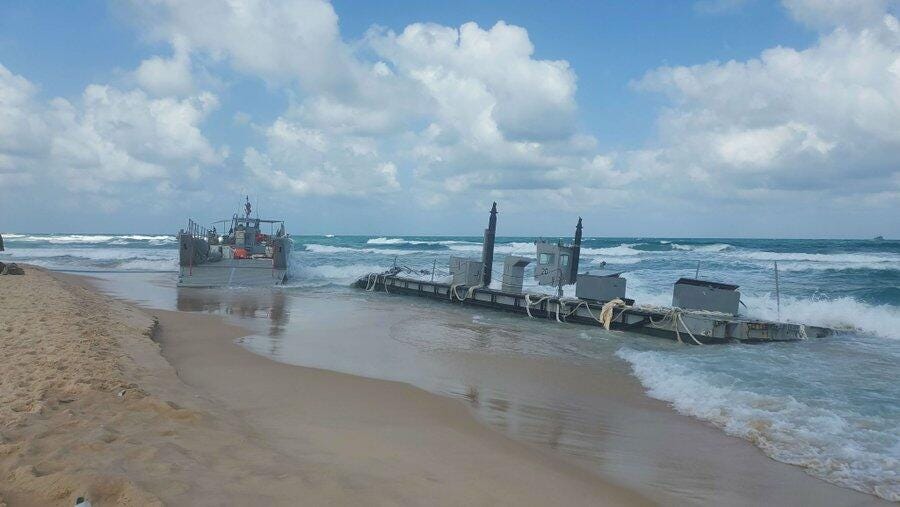Notes from the edge of civilization: May 26, 2024
Canada's Mounties struggle to go green (HINT: maybe stick with horses!); the Gaza aid pier is adrift; Donald Trump may still get a chance to sink the WHO pandemic treaty (but will he?); and more!
It isn’t easy going green, at least not for North America’s largest law enforcement fleet.
The Royal Canadian Mounted Police (RCMP) is struggling to meet its commitment to switch 12,000 police cars over to electric vehicles within the next 10 years to lower its carbon footprint.
While road testing two Teslas for police service, the agency cited a few concerns, including reduced battery range when driving at high speeds, the ease with which a suspected criminal could escape from the glass sunroof, and the extensive amount of retrofitting needed to equip the vehicle for law enforcement purposes.
"You basically have to tear the interior of the car apart so that you can run the wiring,” Andres Casimiri, manager of the RCMP national fleet program, told the CBC. “You're talking the lights, siren, light controller, the light bar, the radio."
It seems unlikely the Mounties will meet the goal of greening their fleet this decade — so chances are, exceptions will be made. The Treasury Board of Canada, which is implementing the government's greening strategy, told CBC they would “work with the RCMP ‘where necessary’ if an all-electric fleet is not feasible.”
In a country as big and remote as Canada, Casimiri is going to need to get creative. Maybe he should think about reaching out to this person for ideas?

While we’re on the subject of poorly thought out ideas, the expensive Gaza aid pier is turning out to be a spectacular disaster on so many fronts. On Friday, the New York Times revealed that humanitarian supplies were being ransacked as soon as they were offloaded from the pier:
The Defense Department predicted that a steady stream of humanitarian aid would be arriving in Gaza via the pier by now, but little relief has reached Palestinians in the besieged strip, officials acknowledged this week. Several trucks were looted as they made their way to a warehouse, the U.N. World Food Program said, and the complexity of operating the pier project in a war zone is continuing to slow distribution.
Then, on Saturday, the pier broke free of its moorings and ran ashore on an Israeli beach while it was being tugged in stormy seas. Two more ships dispatched to help extract the stuck pier and its companion tug also ran aground later in the day, according to US Central Command. Surely our adversaries must be taking notes on how our failed hubris and constant meddling in overseas affairs is underpinned by… well, nothing much. Worse, is it possible through this rather unfortunate exercise in military engineering off Gaza that our aura of invincibility is finally no more?
Don’t get us wrong — building and maintaining an unnecessary $320 million pier, while sending weapons to your ally who controls access to the very lands to which you want to deliver humanitarian aid is a real noodle scratcher. One would think, through the art of statecraft, something could have been negotiated, but then there’s a reason it’s now dubbed the ‘lost’ art of diplomacy. Nevertheless, to learn more about why complexity, interdependencies, and non-linear thinking are paramount to dissecting war strategy, be sure to catch our latest episode of the Collapse Life podcast, featuring Navy veteran and defense expert Dr. Crisanna Shackelford.
Is America ready for non-linear warfare?
This weekend we celebrate Memorial Day — a day set aside to honor the US military personnel who died serving our nation. There’s much talk these days of whether we may again be headed to war, or in fact whether the whole world may be headed to war. Some say we are already in a global war, many people just don’t know it yet.
In an interesting and unexpected development, efforts by WHO member states to hurriedly complete negotiations on a pandemic accord before next week’s meeting of the World Health Assembly ended unsuccessfully this week. Key articles in the draft text were still unresolved on Friday evening, including how to equitably share vaccines and medications in the event of another international health emergency.
This does not mean the pandemic treaty is dead — not by a long shot. It just means the attempt to have countries agree and adopt these measures before the US elections in November are now scuttled.
The specter of Donald Trump winning the election was a particular concern for some proponents of the treaty including Lawrence Gostin, a co-author and negotiator of the draft text who heads up the WHO Center on Global Health Law. Gostin told the New York Times on Friday that Trump was metaphorically “in the room” with negotiators.
“If you postpone it and he’s elected, then he blows up the entire process, and there is no treaty,” Gostin said.
Negotiations on the treaty, as well as on amendments to the International Health Regulations, will most definitely continue. So for those who opposed these efforts, now is not the time to look away. Additionally, the United Nations is working on a ‘Pact for the Future,’ to be discussed and adopted at a September summit, and many issues related to health coordination are bound to reappear there.
Meanwhile, if you’re someone who thinks raw milk has health benefits and should be legal, you might be right wing. At least, that’s how the Times tried to spin it on Friday.
Ten paragraphs in, the reporter concedes that this really isn’t a left-right political issue at all, and then goes on to share unsubstantiated misinformation about its lack of benefits.
Right-wing commentators aren’t the only proponents of raw milk. For years, wellness influencers have promoted raw milk as a healthier alternative to pasteurized milk, misleadingly claiming that drinking it will confer immunity to diseases like E. coli and salmonella.
We’re now wondering if the Grey Lady reads Collapse Life, since we wrote just this week about how the bird flu fear porn has been a perfect vehicle for mainstream attacks on raw milk to resurge.
Read about research that shows how raw milk can help with allergy symptoms in this week’s Vital Animal News, from our friend Will Falconer, DVM.









I would not be surprised by some small benefits for immune systems from whole milk but rather than promoting that, I think it should be folded into the promotion of breastfeeding of babies. Especially when the colostrum is being produced. That is how our immune systems are primed at birth. We don't share that many pathogens with cattle for it to be nearly as effective.
But like so many other areas, things are promoted for reasons that are not beneficial to us. Our culture has been steered by other forces. When "solutions" are created, it is always structured to benefit others.
A woman (dare I use that label?) breastfeeding a baby doesn't generate any income for anyone. She is not buying formula and baby food. She is not out working to generate income for companies and taxes for the government.
When they create solutions for housing, the only thing that they promote is for creating rental property. It is good for landlords and taxes for the income generated. When housing is built, the focus is on bigger and more expensive houses so the developers make more money and they can generate higher tax revenues.
It isn't always some people sitting together coordinating everything like the WEF, no matter how hard they try. It is mostly just a host of independent people with the same goals trying to convince people of the same things. You need the latest gadget. You shouldn't have to be bothered cooking, just go to a restaurant. You need a backup camera, proximity sensors, and 12 airbags in a car to be safe. You need to work for someone else to eliminate any risk. Everything must be done by experts because you are not qualified. You need to travel fast. You need the latest fashions. You need the bigger place to live.
Oh, Canada! What hast thou done to thyself by electing "leaders" with no virtue but plenary evil within them.